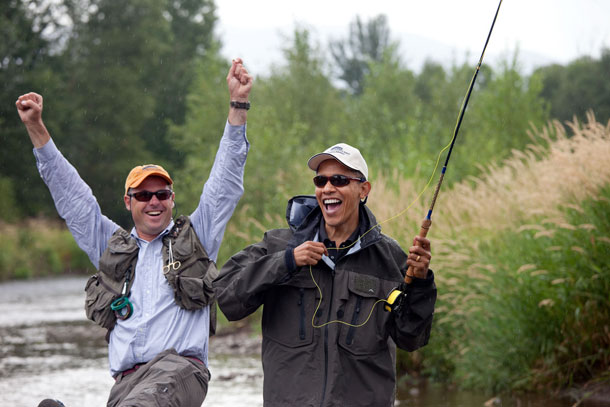EXPOSE OBAMA
April 2nd, 2010 By Beth Daley, Boston Globe
 Obama is really cracking down on fishing
Obama is really cracking down on fishing
The federal government finalized the most fundamental changes in New England fishing rules in more than a generation yesterday, over the strenuous objections of many fishermen who say they will be put out of business.
The new rules, which take effect May 1, come after years of effort by the federal government and environmental groups to stop overfishing of the region’s fabled cod, flounder, and other bottom-dwelling species that once were said to be so plentiful that colonists caught them simply by lowering baskets into the sea.
The rules encourage boat owners to organize into groups that will be allocated a share of the annual quota for each species, and already fishermen who account for the vast majority of the catch in New England have voluntarily formed groups, called sectors. The system is designed to give fishermen more financial incentive to be good stewards of the sea and more flexibility in deciding who fishes and when, such as allowing fishermen to avoid bad weather.
The government is also lowering the total amount of many species of fish that can be caught.
Although some fishermen say the idea has merit, most say it is going into effect too quickly and the catch limits are too harsh. The end result, they say, will be fishermen losing jobs across New England.
“The bottom line is there hasn’t been enough analysis on these catch shares,’’ said Richie Canastra, co-owner of the Whaling City and Boston Seafood auctions. He said he fears that 50 percent of the region’s fishermen could be squeezed out of business by the rules.
“We are getting these sectors forced down our throat,’’ he said.
For almost three decades, New England fishermen have been subject to a dizzying array of restrictions that have attempted to control fish populations by limiting how many days fishermen could fish each year, where they could go in the ocean, and how many fish they could land on each voyage. But technology outpaced the tightening restrictions, allowing fishermen to find fish more easily and continue to catch too many overall, according to the federal government. The end result, federal regulators say, is too many boats chasing too few fish — preventing many depleted fish populations from fully rebuilding.
Although the new rules allow boats to still catch fish under the old rules, they make it financially unattractive to do so. About 812 of the region’s 1,480 boats that fish for bottom-dwelling species have opted for sectors — they represent 98 percent of fish landings in recent years.
“Fishermen are understandably apprehensive about the changes, not only because they mean significant catch cuts, but also because for many it means doing business in a completely new way,’’ said Patricia Kurkul, the National Oceanic and Atmospheric Administration Northeast fisheries regional administrator. “Taking these actions is critical to the long-term health of the fish and the fishing businesses that rely on them.’’
The new rules are also highly complicated. Although catch shares have worked in many fisheries, this is the first time the concept is being broadly applied to New England’s unique bottom-dwelling fish, where species of many types are found together and hauled up in nets.
NOAA has committed about $47.2 million in the last two years to help start sectors, conduct at-sea research, and work to create better fishing gear that enables fishermen to be more selective in the fish they catch.
Fishermen, with the support of Governor Deval Patrick, say they believe the federal government is undercounting many species of fish, including pollock. Under the new rules, undercounting could have serious implications because all fishing could stop if fishermen haul up too many fish that are doing poorly, such as yellowtail flounder.
“Under the plan, the weakest fish controls everything else,’’ said Brian Rothschild, Montgomery Charter professor of marine science and technology at the University of Massachusetts at Dartmouth. Last week, Mayor Scott Lang of New Bedford asked NOAA officials to temporarily delay the new rules until they get the “science straight’’ on fish populations.
But NOAA officials said the new rules allow Kurkul to alter catch limits far more quickly than in the past if stocks are shown to be improving. The agency is currently reanalyzing two species, including pollock.
“If these stocks are improving — and we do not know that yet — we will work to put that information into action, which could mean an increase in the allowable catch for both stocks without damaging rebuilding,’’ said Eric Schwaab, assistant administrator for the NOAA Fisheries Service.
Beth Daley can be reached at bdaley@globe.com. ![]()
Note: Maybe Obama can force his new health care reform down the throats of the fish! Living in a New England state that depends upon the sale of fishing/hunting licenses to help support Fish and Game, I would say this new "war on fishing" will have a greater impact not just for fishermen, but also the State Department that monitors fishing, a recreatonal sport. Bee Sting
